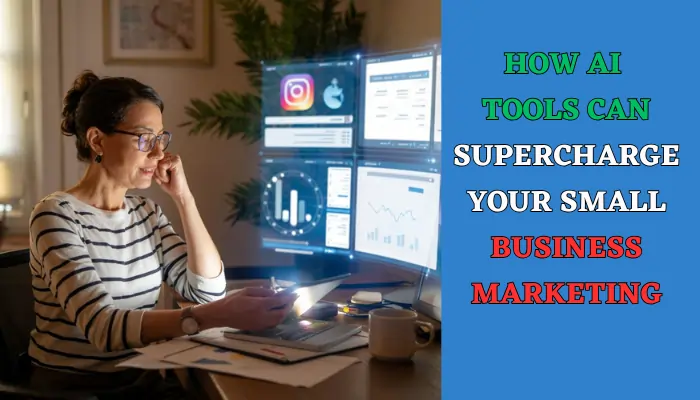Running a small business means your job description is always expanding. One minute you’re troubleshooting a delivery issue, the next you’re designing a flyer for next weekend’s pop-up.
Somewhere in between, you’re expected to market your business like a seasoned strategist.
But let’s be honest—there’s only so much of you to go around.
If marketing feels like a game of whack-a-mole, that’s where artificial intelligence can quietly step in, not with flash or gimmicks, but with useful, everyday support. And no, this doesn’t mean surrendering your brand voice to a robot.
It means finally getting a little help in the places where it counts.
Automate the Busywork So You Can Think Big
There’s a reason content consistency is so hard to maintain—it’s relentless. One skipped post turns into two, and soon your audience has gone silent.
AI can’t replace your voice, but it can help structure and schedule your ideas so you’re not reinventing the wheel each day.
Whether it’s social updates, email drafts, or promotional calendars, these tools act like a quiet assistant who’s always on time and never forgets the plan.
Smarter Customer Insights Without Needing a Data Science Degree
The best marketers know how to read a room, and for small businesses, that room is your data.
Website traffic, email opens, purchase trends—these all tell a story, but it’s easy to miss the plot when you’re buried in numbers. AI simplifies the translation.
Instead of requiring you to interpret graphs or spreadsheets, it highlights patterns and behavior shifts in plain language, nudging you to adjust before problems grow or opportunities pass.
Personalization Without the Creep Factor
Nothing builds loyalty faster than making people feel seen.
AI can’t write heartfelt thank-you notes or remember a customer’s name from two years ago—but it can help you mimic that level of care across digital channels.
By quietly tracking behavior and timing, it helps you send the right messages to the right people at the right moment.
You’re still in charge of the tone and content—it just gives you the map instead of leaving you to guess in the dark.
Streamline Market Research
Digging through dense research reports isn’t exactly how most business owners want to spend their time.
That’s where an AI-based PDF summarizer can quietly step in, pulling out the key points so you don’t have to read hundreds of pages just to get the gist.
It cuts down the hours spent manually reviewing market data and lets you spot what matters faster.
If that sounds like something your workflow could use, this is a good resource to check out.
Level the Creative Playing Field
Not every business owner has a background in design or copywriting, and that’s perfectly fine.
AI tools won’t turn you into a professional designer overnight, but they can help you cross that intimidating blank-page barrier.
A rough draft is often all you need to get moving, and that’s exactly what these systems offer—starting points you can shape into something that sounds and looks like you.
It’s not about perfection; it’s about getting unstuck.
Make Ad Spend Go Further
Paid advertising can be a black hole if you’re not careful.
One wrong targeting choice and your money vanishes without a trace. AI doesn’t guarantee success, but it does help you experiment smarter.
By learning from past results, it can suggest adjustments to your messaging, audience, and timing—helping you stretch your budget instead of burning through it.
You still decide the direction, but now you have a compass instead of just gut instinct.
Chatbots That Don’t Sound Like Robots
Great customer service doesn’t always happen during business hours.
AI-powered chat can step in when you’re unavailable, handling simple questions and filtering out the noise.
These bots have evolved—they’re less mechanical now, more conversational, and you can usually train them to reflect your tone.
They won’t replace a human connection, but they’ll keep the experience consistent until you’re back at your desk.
The Human Element Still Matters
Let’s not pretend AI is going to replace what makes your business special.
People come to you for a reason—your voice, your values, your way of doing things.
The best use of AI is to handle the stuff that pulls you away from those strengths.
It’s like a background engine, humming along so you can steer the ship with both hands on the wheel. You’re not giving up control; you’re reclaiming your focus.
At the end of the day, marketing doesn’t have to be your full-time job, even if you’re wearing all the hats.
The right AI tools aren’t loud or showy—they just work behind the scenes, giving you space to think clearly and act intentionally.
So if you’re tired of chasing algorithms and deadlines, consider handing over the logistical reins.
You’ll still be the one making the decisions—just with better timing, sharper insight, and a little less caffeine-fueled chaos.


